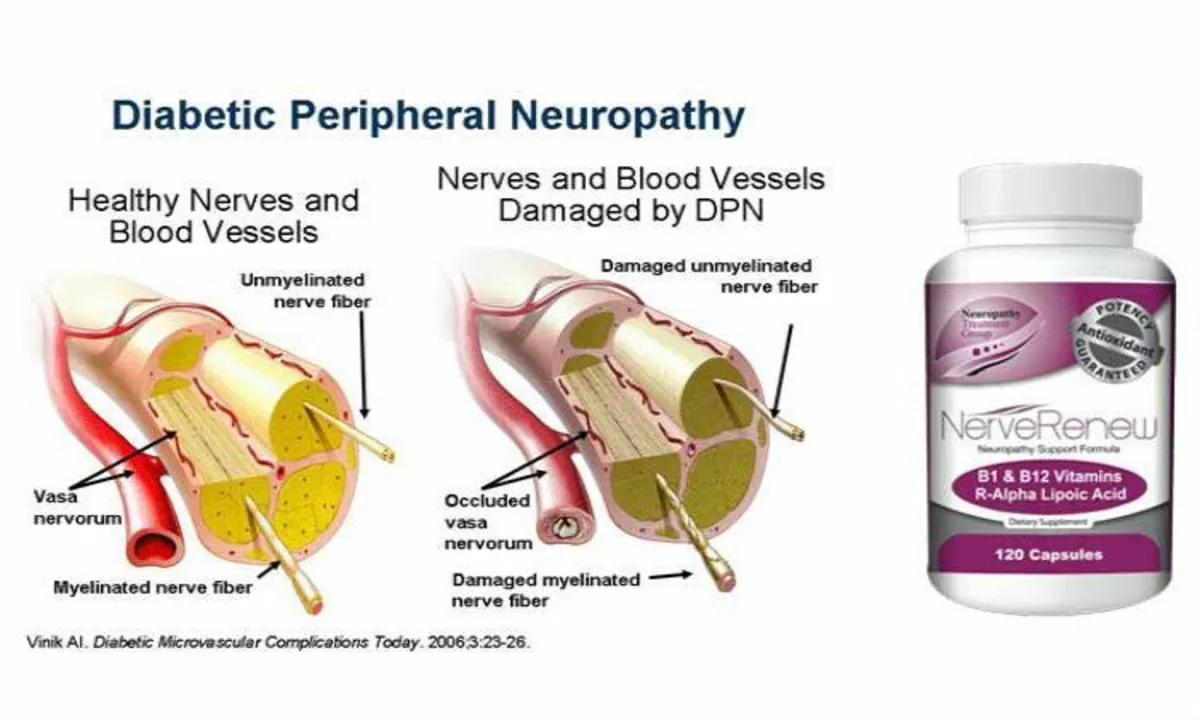Understanding Diabetic Peripheral Neuropathy
As a diabetic, it is essential to be aware of the complications that can arise from your condition. One such complication is diabetic peripheral neuropathy, which is a type of nerve damage that occurs in the extremities, such as the hands, feet, and legs. Diabetic peripheral neuropathy can cause a range of symptoms, including pain, tingling, and numbness. In some cases, it can also lead to vision loss.
In this article, we will discuss the connection between diabetic peripheral neuropathy and vision loss, as well as some important steps you can take to reduce your risk of developing these complications. So, let's dive in and explore everything you need to know about diabetic peripheral neuropathy and vision loss.
How Diabetes Affects the Nervous System
Diabetes affects your body in many ways, and one of the most significant impacts is on your nervous system. High blood sugar levels can damage the nerves throughout your body, leading to a variety of complications. The most common type of nerve damage in diabetics is peripheral neuropathy, affecting the nerves in the extremities, such as the hands, feet, and legs.
Peripheral neuropathy can cause a range of symptoms, including pain, tingling, and numbness. In some cases, it can also lead to vision loss. This is because the nerves responsible for vision are also part of the peripheral nervous system. As a result, if diabetic peripheral neuropathy affects these nerves, it can lead to vision problems and, in severe cases, even blindness.
Signs and Symptoms of Diabetic Peripheral Neuropathy
Diabetic peripheral neuropathy can manifest in various ways, and the symptoms can range from mild to severe. Some common signs and symptoms of diabetic peripheral neuropathy include:
- Pain, tingling, or numbness in the hands, feet, or legs
- Weakness or loss of muscle tone in the affected areas
- Difficulty walking or maintaining balance
- Loss of coordination
- Increased sensitivity to touch and temperature changes
- Ulcers, infections, or other skin problems in the affected areas
It's important to keep in mind that not everyone with diabetic peripheral neuropathy will experience all of these symptoms, and the severity of the symptoms can vary greatly from person to person.
Diabetic Retinopathy and Vision Loss
Diabetic retinopathy is another diabetes-related complication that can lead to vision loss. It occurs when high blood sugar levels damage the blood vessels in the retina, the light-sensitive tissue at the back of the eye. Over time, this damage can cause the blood vessels to leak fluid or bleed, leading to vision problems and, in severe cases, blindness.
Diabetic retinopathy is the most common cause of vision loss in people with diabetes and is a leading cause of blindness among adults worldwide. It's essential to be aware of the signs and symptoms of diabetic retinopathy and to take steps to manage your diabetes to reduce your risk of developing this complication.
Preventing Diabetic Peripheral Neuropathy and Vision Loss
While diabetic peripheral neuropathy and vision loss can be severe and life-altering complications, there are steps you can take to reduce your risk of developing them. Here are some tips for preventing diabetic peripheral neuropathy and vision loss:
- Manage your blood sugar levels: Keeping your blood sugar levels as close to your target range as possible is crucial for preventing nerve damage and other diabetes-related complications.
- Get regular eye exams: Early detection and treatment of diabetic retinopathy can help prevent vision loss. Be sure to schedule regular eye exams with an eye care professional, even if you aren't experiencing any vision problems.
- Maintain a healthy lifestyle: Eating a balanced diet, exercising regularly, and managing stress can all help support your overall health and reduce your risk of developing diabetes-related complications.
- Quit smoking: Smoking increases your risk of developing diabetic peripheral neuropathy and other diabetes-related complications. If you're a smoker, talk to your healthcare provider about strategies for quitting.
- Monitor your feet: Regularly inspect your feet for any signs of injury, infection, or other issues. If you notice any problems, be sure to seek prompt medical attention.
Treatment Options for Diabetic Peripheral Neuropathy and Vision Loss
If you're already experiencing diabetic peripheral neuropathy or vision loss, it's essential to work closely with your healthcare provider to develop a treatment plan. Treatment options for diabetic peripheral neuropathy may include:
- Pain-relieving medications
- Physical therapy
- Occupational therapy
- Alternative therapies, such as acupuncture or biofeedback
For diabetic retinopathy and vision loss, treatment options may include:
- Laser therapy to seal leaking blood vessels or shrink abnormal blood vessels
- Injection of medication into the eye to reduce swelling or the growth of abnormal blood vessels
- Surgery to remove blood or scar tissue from the eye
Remember, early detection and intervention are crucial for the best possible outcomes in managing diabetic peripheral neuropathy and vision loss. Don't hesitate to reach out to your healthcare provider if you're experiencing any symptoms or have concerns about your risk of developing these complications.







Comments
Oliver Johnson
29 April 2023Look, the way they hide the truth about diabetes complications is a slap in the face of anyone who dares to question the system. They feed us glossy articles while the real pain rots our nerves and eyes. Wake up, stop trusting the glossy brochures, and demand real action now. The government and pharma are colluding, and we can't let that slide. It's time to fight for honest info and real solutions.
Taylor Haven
4 May 2023When you read about diabetic peripheral neuropathy and vision loss, you have to realize that the whole narrative is a carefully constructed lie designed by hidden elites to keep us obedient and dependent on a broken healthcare system. They sprinkle in scientific jargon, making us think they're unbiased, but in reality, each statistic is selected to manipulate us into buying expensive treatments that line the pockets of a few. The truth is that most of these so‑called complications could be avoided if we weren’t shackled to sugar‑laden diets imposed by multinational corporations. Every time you get a prescription, you’re signing a contract that reinforces their control, and the real cure-lifestyle freedom-remains out of reach because of their relentless propaganda. It is our moral duty to see through this charade, reject the pharmaceutical narrative, and reclaim our health before they completely drain our vision and our will.
Sireesh Kumar
8 May 2023Alright, let me lay it out for you because the internet is awash with half‑baked advice that nobody really knows the depth of. First, the peripheral nerves aren't just highways for feeling; they're integral to the microvascular network that silently supports ocular health. When hyperglycemia spikes, it triggers a cascade of oxidative stress, directly assaulting the tiny vessels that nurture the retina, and that’s why you see the blurry vision creeping in. Second, the often‑ignored fact is that the same advanced glycation end‑products that gnaw at your feet also accumulate in the optic nerve, creating a feedback loop that accelerates degeneration. Third, you need to understand that foot care isn’t just about preventing ulcers; it’s a proxy for systemic monitoring-if you can feel a tingling in your toes, chances are your eyes are already whispering warnings. Fourth, regular eye exams aren’t merely a checklist item; they are a window-literally-into how well your glucose regulation is holding up. Fifth, diets rich in low‑glycemic index foods stabilize blood sugar, which in turn reduces the glycation burden on both peripheral nerves and retinal vessels. Sixth, exercise is not just about weight loss; it ramps up circulation, flushing out inflammatory mediators that would otherwise poison neural pathways. Seventh, smoking is a silent assassin that narrows blood vessels, compounding the damage already wrought by sugar spikes-quit, and you’ll give both your feet and eyes a fighting chance. Eighth, stress hormones like cortisol further impair insulin sensitivity, magnifying the neuro‑vascular assault you’re already battling. Ninth, medications such as ACE inhibitors have been shown to protect microvasculature, offering a dual benefit for heart and eye health-ask your doctor about them. Tenth, the role of vitamin D is emerging as a neuroprotective agent; deficiency can exacerbate neuropathic pain and may even influence retinal health. Eleventh, the myth that “just take your meds” is a dangerous oversimplification-adherence without lifestyle overhaul is like putting a bandage on a leaking pipe. Twelfth, you must track your feet daily; a tiny blister can be the first sign that systemic control is slipping, serving as an early warning before vision loss hits. Thirteenth, technology like continuous glucose monitors can provide real‑time feedback, helping you stay within target ranges and thus sparing nerves and eyes. Fourteenth, community support groups give you accountability and shared wisdom, which dramatically improves long‑term outcomes. Fifteenth, remember that early detection is not a passive event-actively ask your eye doctor about retinal thickness scans, as they can spot subtle changes long before you notice any vision shift. In short, the body is an interconnected system, and ignoring one piece invites disaster in another; treat your whole self, not just isolated symptoms, and you’ll keep both your steps and your sight firm.
Ritik Chaurasia
13 May 2023Listen up, the whole world needs to know that ignoring diabetic complications is a cultural betrayal, especially when we have the knowledge to protect our elders. The lazy attitude toward foot checks and eye exams is a disgrace that reflects a deeper societal neglect. Stand up, demand better education, and push for community programs that actually care about people’s nerves and sight. No more excuses, the battle for health is cultural, and we must win.
Gary Marks
18 May 2023Man, this article reads like a sugar‑coated bedtime story that pretends to care while it quietly feeds the capitalist machine that profits off our misery; it’s a sham‑filled parade of pleasantries that mask the cold, hard truth that most people will never see the light of day because the system sucks the life out of them faster than a diabetic’s blood sugar spikes after a donut binge, and the way they sprinkle in those “tips” about diet and exercise feels like a mocking whisper from a ghost that wants you to believe you can just will away the nerve damage while the pharmaceutical overlords sit back, laughing as they count their endless profits from the endless pills and laser treatments; honestly, the article does a disservice by glossing over the real horror of how neuropathy silently creeps into your veins, turning simple walks into a nightmare and blurring the world into a hazy mess, and it’s a joke to think that a quick foot inspection will suddenly make everything okay when the underlying problem is a broken system that refuses to give us the tools we need; so yeah, keep spewing those motivational quotes and colorful diagrams, but know that they’re just a veil over the abyss that’s waiting to swallow our sight if we don’t tear down this corrupt edifice now.
Steven Young
23 May 2023People need to realize that the information they are handed about diabetic neuropathy is filtered through a hidden agenda and the simple advice hides a larger scheme that keeps us dependent on medical monopolies. The way they mention “regular eye exams” without mentioning the cost is a clue that they want us to ignore the financial barriers that keep many from getting proper care. Look beyond the surface and you will see that the whole narrative is designed to keep us compliant and buying treatments that profit the elite.
Kelly Brammer
27 May 2023It is a moral imperative to treat diabetes with the seriousness it deserves, and that includes taking proactive steps to monitor neurological and visual health. Neglecting regular check‑ups not only endangers the individual but also places an undue burden on the healthcare system that could be avoided with responsible self‑care. Let us all commit to vigilance and compassion for those facing these challenges.
Ben Collins
1 June 2023Oh great, another reminder that you should actually look at your own feet.
Denver Bright
6 June 2023I can’t help but notice that many people keep saying “just quit smoking” as if it’s a simple switch, when in reality it’s a huge hurdle that most folks can’t just hop over without real support, and the article glosses over that struggle, making it seem like a tiny footnote rather than the massive barrier it truly is for countless individuals battling addiction while also dealing with diabetes complications.
Jonathan Harmeling
11 June 2023Honestly, it’s baffling how often we hear “manage your blood sugar” tossed around like a generic catch‑phrase, while the real issue is the systemic lack of access to affordable healthy food and education that leaves so many people fumbling in the dark, and if we keep repeating empty slogans without addressing these root causes, we’re just talking in circles while patients suffer.
Craig E
15 June 2023One might reflect that the journey through diabetic neuropathy and potential vision loss is not merely a medical challenge but a profound lesson in humility and resilience, urging us to cultivate patience, seek community wisdom, and embrace the quiet strength that emerges when we confront our vulnerabilities with both intellect and compassion.
Marrisa Moccasin
20 June 2023Wow!!! This article totally skips over the fact that the very labs that test our blood sugar are owned by the same corporations that push the most expensive treatments!!! It’s like they want us to believe that only by spending millions can we get real help!!!
Caleb Clark
25 June 2023Hey team, keep pushing forward with those healthy habits because every little step counts towards protecting both your nerves and your eyes!!! Remember to log your blood sugars daily, do those foot checks like a pro, and schedule that eye appointment well before any blurry moments creep in!!! And don’t forget, staying active, even just a short walk each day, can boost circulation and help keep those nerves happy!!! If you ever feel overwhelmed, reach out to a friend or a support group – you’re not alone in this journey!!! Keep that positive mindset, stay consistent, and watch how your dedication pays off in clearer vision and stronger steps!!!